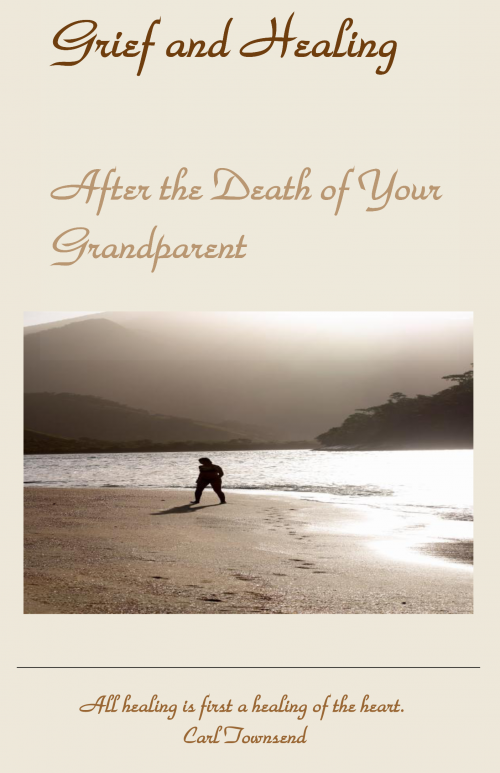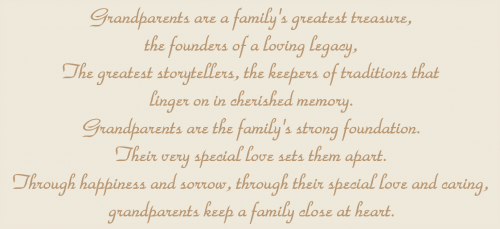

Most of the information about grieving the death of grandparents is aimed at children. Many of us have been fortunate to have grandparents who lived well into our adult years. Through them we have been connected to our family’s history going back a long way. When they die, it might seem such a natural part of the order of things that our loss is not fully recognized – even by us! Yet a grandparent has been a living touchstone throughout our lives. Through them, we have witnessed the span of life to advanced age.

Your grandparent is one among the small circle of people who have always been part of your life, along with your parents and older siblings. Now your world is different than it ever has been. That can be a big adjustment. For some, a grandparent has been mom or dad when a parent died or was unable to be there. Grandparents may have been the family home base, where you went on holidays and vacations. They came to you for special occasions and in times of need. Losing a grandparent can mean letting go of traditions that have been very significant throughout your life.
For now, all that really matters is that your grandparent is gone and your heart feels the pain of the loss.

There’s a kind of helplessness that may come with grief. You are facing a problem without a solution. Someone you love has died and there’s no way to undo that circumstance. In that helplessness lies the inclination to endure grief silently and alone, acting like it doesn’t hurt or you’re handling it better than you are. Eventually you may become used to the feelings of loss and think that time has healed you. Sadly, people end up carrying around great weights of accumulated sadness that they thought was behind them just because time had passed. That baggage can result in weariness, a lack of enthusiasm or hope, emotional and relationship problems, even physical health problems.
If you find that your thoughts, emotions and actions are troubling you and interfering with your life and sense of well-being, you can do something about it. The decision to try to get better is very often the point at which helplessness dissolves and improvement begins. Just imagining that there might be life beyond your grief can be a tremendous relief. The alternative is the fear that you may feel this way for the rest of your life – and most people would rather not have to endure that.
Grief is normal and natural. Grief goes with loving. When you love someone, you hurt when that person dies. In a way, it is a cost of loving. Sometimes people wonder, when they are stricken with the deepest pain of loss, if it was a mistake to love so much. When asked, “Would you have had it any other way?” the answer is always, “No!”

Since you have read this far, you probably are affected by grief deeply enough to want to do something about it. What might you do that would help you go through this time of grieving?
Here are a few ideas that have proven helpful to many people:
*Use your resources. Reach out for support from family, friends, members of your faith community - anyone who is part of your network of relationships. If you have established patterns, routines or rituals of spiritual, emotional and physical health, use them to deal with the current state of your life. Praying, journaling, working out and other activities can be valuable aids to both endurance and healing when you are grieving.
*Find new resources. There are all kinds of printed materials to provide information, inspiration and direction that can help grieving people. Ask around, visit a bookstore or library, go online. Look for titles and descriptions that speak to you. There are many grief-related connections online, including websites, articles, chats and blogs, as well as links to local support providers.
*Seek community or professional support. Hospices, funeral homes, faith communities and other organizations provide support groups, informational meetings, classes and counseling for grievers. Grief counselors, mental health therapists, spiritual leaders, chaplains and others can provide individual help as you work through your grief experiences.



